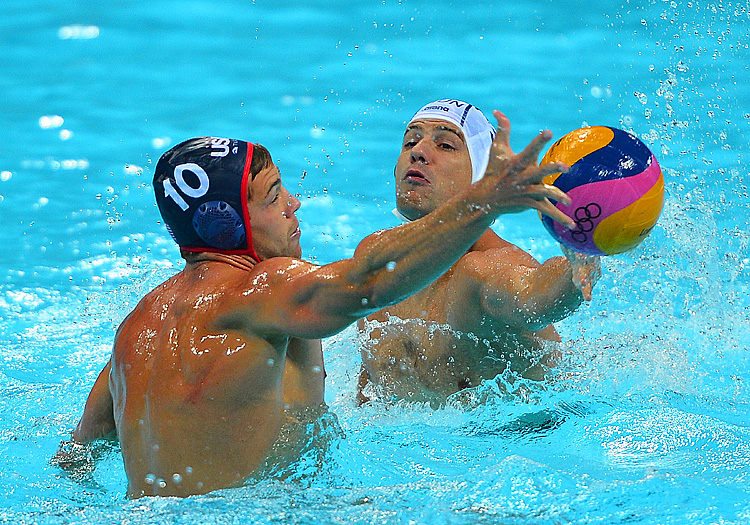Three-time defending Olympic champions Hungary defeated the American men’s water polo team 11–6 Monday—actually a good performance for the Americans considering Hungary has scored 17 twice in the prelims.
Hungary, with five Olympic golds, 9 world championships, five FINA (International Swimming Federation) World League, eight FINA World Cup and 21 European championships is considered the best team in the world. While they haven’t dominated in London, losing two of four matches, Hungary has shown that it can get power plays and convert, and can score from anywhere in the pool. In short, even if the team doesn’t always win, it is still the best.
The U.S. squad held Hungary to a single goal in the first period but trailed 6–2 at halftime. Hungary stretched the lead to 10–3 by the end of the third, but the Americans owned the final period,scoring three and holding Hungary to a single goal.
Hungary’s power play was excellent as usual, converting 67 percent of its opportunities. The team also generated three penalty shots, often a measure of a team’s two-meter defender’s tactical ability to draw his opponent into committing a visible offense. (Underwater cameras show non-stop grabbing, punching, kicking, and suit-pulling; what matters is what the officials see above the water.)
The United States beat Hungary in a tournament in Newport Beach, California in May. Possibly Hungary wanted revenge, and possibly USA was a bit complacent. Also a possibility is that the U.S. team knew that knew it would advance to the quarterfinals and wasn’t too concerned about the final tally, more interested in seeing strengths and weaknesses.
This was the U.S. side’s second 11–6 loss; Serbia beat them by the same score on Saturday.
Ryan Bailey, part of the Beijing Olympics silver-medal team, explained that the U.S. squad wasn’t lacking confidence despite the two defeats.
“Serbia and Hungary are two of the best teams in the world and they made us look pretty bad in there, so we are going to have to go home and regroup and get ready for the quarterfinals, because that’s the only game that really matters,” the 36-year-old center-forward told NBC Sports.
“They [Hungary] have a lot of weapons. They have to really good left-handers; they have some good weapons on the other side as well. We were trying to take away what they wanted to do but they were finding solutions and really exposing us.
“That’s the good thing about being an experienced team. We’ve been around the block; we’ve been in these situations before. We go home, regroup, and we will be ready to play Croatia.”
Hungary hit twice as many shots (11/23 vs. 6/24 for the U.S.); they converted four of six power-play opportunities versus four of eight for the U.S.; they had twice as many steals.
Hungary was also twice as effective on defense, stopping every single U.S. attempt from the 5-meter line. Interestingly, the U.S. squad had as many blocks.
This seems to indicate that the U.S. dropped back to clog the middle on defense, both to take away shots and to avoid two-meter penalty violations. It’s didn’t work; Hungary got three penalty shots to USA’s one. It also shows that Hungary plain outswam the U.S. to defend the long shots.
Still this same U.S. squad beat Hungary just a few months ago. The U.S. team has the tools; they can review the tapes, devise new strategies, and work on their weaknesses.
As Ryan Bailey said, the preliminary games don’t really matter. USA won silver in Beijing; they could still take gold in London.






